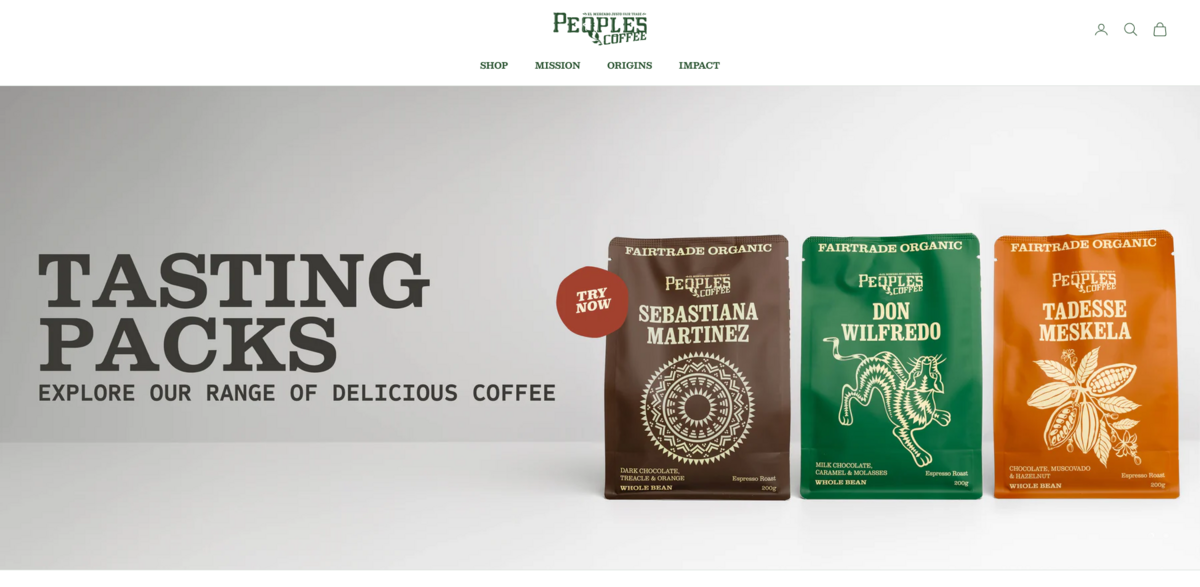About Peoples Coffee: Brewing Ethics and Quality in Every Cup
Founded back in 2004, Peoples Coffee has been on a mission to source organic coffee from fair trade grower cooperatives, aiming to empower an ethical supply chain from seed to cup. It’s not just about coffee here; it’s about connecting people, nature, and communities through a responsible approach that guarantees exceptional taste, environmental care, and fairness to those who cultivate it. Based in New Zealand, specifically Newtown, Wellington, Peoples Coffee stands out in the speciality coffee scene by sticking to simplicity and quality without compromise.
Main Benefits of Peoples Coffee’s Ethical Approach
Peoples Coffee’s commitment shines through in several key ways:
- Founded in 2004 with a clear vision for ethical sourcing
- Exclusive use of organic and fair trade coffee from small lot farmers
- Supports farmer cooperatives that produce 80% of the world’s coffee
- Fair Trade Organic contracts pay farmers a 40c premium per pound (as of August 2023)
- Additional social premiums of 30c per pound fund community development projects
- Long-term trade partnerships ensure stability and fairness for farmers
- Travels to coffee cooperatives annually (except during 2020-2022) to maintain strong relationships
Understanding Organic Coffee and Its Environmental Impact
Organic coffee isn’t just a health trend—it’s a choice that prioritises the environment. Small lot farmers who use organic farming techniques are protecting their land for generations to come. These methods ditch chemical inputs like herbicides, pesticides, and synthetic fertilisers, replacing them with natural minerals and responsible farming practices, including permaculture principles. Sure, it’s labour-intensive and costly, which is why an organic premium is built into the prices paid to farmers. But this premium supports sustainability and the health of ecosystems, making every cup a little kinder to the planet.
Fair Trade Coffee: Empowering Farmers and Communities
At the heart of Fair Trade coffee are farmer cooperatives—groups of small lot farmers who band together to access markets, infrastructure, and training they couldn’t manage alone. These cooperatives are essential for tracing coffee origins and ensuring farmers receive a fair price. The Fair Trade system includes social premiums, extra funds that cooperatives use for community projects initiated by the farmers themselves. This approach fosters long-term partnerships that truly make a difference, supporting farmer viability even when commodity prices dip, thanks to minimum price guarantees negotiated with cooperatives.
Why Multi-origin Coffee Blends Matter
Peoples Coffee crafts multi-origin blends to create a balanced and exciting palate. By combining distinct coffee flavours from different regions, these blends offer a richer, more complex taste experience. It’s a way to celebrate diversity in coffee while supporting multiple farming communities. This blending approach also reflects the company’s commitment to ethical sourcing across various origins, ensuring that each cup tells a story of cooperation, quality, and care.
Project Impact: Sustainable Development Goals (SDGs) Linked to Peoples Coffee
- SDG 1: No Poverty – Supporting small-scale farmers with fair prices and social premiums
- SDG 2: Zero Hunger – Promoting sustainable agriculture through organic farming techniques
- SDG 8: Decent Work and Economic Growth – Ensuring fair wages and long-term trade partnerships
- SDG 12: Responsible Consumption and Production – Minimising environmental impact with organic practices
- SDG 15: Life on Land – Protecting ecosystems by avoiding chemical fertilisers and promoting permaculture
Building Trust Through Transparency and Long-term Relationships
Peoples Coffee doesn’t just buy beans and move on. With partners like Trade-Aid Imports, they’ve been visiting coffee cooperatives every year since 2004 (except during the pandemic years) to see firsthand how fair trade systems benefit farmers and their communities. This ongoing engagement helps maintain transparency, traceability, and trust throughout the supply chain. It’s a reminder that behind every cup is a story of dedication, respect, and a shared commitment to doing coffee right.


















